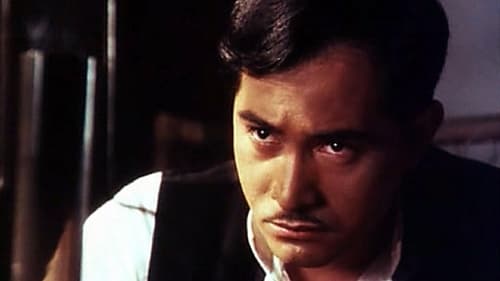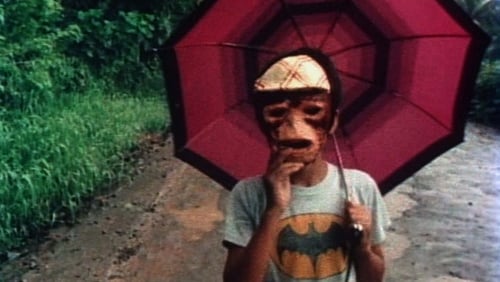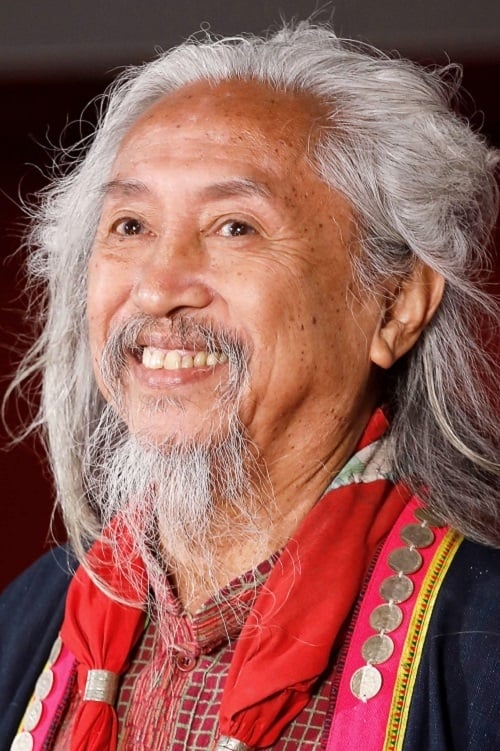Kidlat Tahimik
Рождение : 1942-10-03, Baguio City, Benguet, Philippines
История
Eric de Guia (born October 3, 1942 in Baguio City, Philippines), better known as Kidlat Tahimik (a Tagalog translation of "silent lightning"), is a film director,writer and actor whose films are commonly associated with the Third Cinemamovement through their critiques of neocolonialism. One of the most prominent names in the Filipino film industry, he has garnered various accolades locally and internationally, including a Plaridel honorarium for Independent Cinema. He is dubbed by fellow filmmakers and critics as the "Father of Philippine Independent Cinema".

Director
Kidlat Tahimik’s son, Kabunyan de Guia, embarks on a journey from his hometown of Baguio to the southern urban city of Davao using an orange minivan and explores other places in the Philippines along the way.

Director
This is a Filipino omnibus film about three different journeys.

Director
As the ultimate enfant terrible of Philippine cinema, avant-gardist Kidlat Tahimik refuses to settle on anything, whether it’s the telling of a colonial past, or any version of this film, which he’s been making and revising for nearly four decades. BalikBayan, which means “returnee” in Filipino, is partly about the homecoming of the historical figure Enrique of Malacca, a Malay who Tahimik first played and brought to the screen in 1979. As the slave of the 16th-century Portuguese explorer Ferdinand Magellan he circumnavigated the Earth, before returning home as a free man. Old footage of Enrique, played by the young Tahimik, is mixed with the fictional story of a mysterious old man, played by the present-day Tahimik, and documentary footage of a contemporary artist community in Baguio, in northern Philippines. In this version, Redux VI, Tahimik continues his quest to reconsider the Philippines’ colonial legacy. Shot on 16mm (1979–1980s) and video (1990s–2017).

As the ultimate enfant terrible of Philippine cinema, avant-gardist Kidlat Tahimik refuses to settle on anything, whether it’s the telling of a colonial past, or any version of this film, which he’s been making and revising for nearly four decades. BalikBayan, which means “returnee” in Filipino, is partly about the homecoming of the historical figure Enrique of Malacca, a Malay who Tahimik first played and brought to the screen in 1979. As the slave of the 16th-century Portuguese explorer Ferdinand Magellan he circumnavigated the Earth, before returning home as a free man. Old footage of Enrique, played by the young Tahimik, is mixed with the fictional story of a mysterious old man, played by the present-day Tahimik, and documentary footage of a contemporary artist community in Baguio, in northern Philippines. In this version, Redux VI, Tahimik continues his quest to reconsider the Philippines’ colonial legacy. Shot on 16mm (1979–1980s) and video (1990s–2017).

Panaginip Pictures CEO
A machine capable of recording ideas directly from the mind is invented, and an out-of-work comedian suffering from depression uses it to learn if he still has the gift to make people laugh.

Magellan, the famous navigator, met his untimely death in the Philippines before he could circumnavigate the globe. Ironically, it was his slave and translator Enrique who most likely was the first to achieve the historic feat.

Director
Magellan, the famous navigator, met his untimely death in the Philippines before he could circumnavigate the globe. Ironically, it was his slave and translator Enrique who most likely was the first to achieve the historic feat.

Himself
Documentary profiling the directors involved in the loose Philippine New Wave filmmaking movement.

Director
Produced over 15 years for the JVC-sponsored Tokyo Video Festival, Tahimik’s Video Diaries offers a lovely set of accents to his longer 16mm films. Tropes and themes that recur throughout the director’s career are set in gemlike relief in these brief yet eloquent videos, which include a loving reminiscence of fatherhood on the occasion of Tahimik’s 50th birthday; a tree-planting ritual to celebrate the impending 500th anniversary of Magellan’s voyage; a short documentary on the dying practice of rice terraces, filtered through a homage to Kurosawa; a tribute to the importance of roofs and the strength of bamboo as a building material; and a healing ritual for an oil spill off the island of Guimaras.

Writer
Experimental documentary about roof-making.

Director
Experimental documentary about roof-making.

Writer
Documentary about an oil spill near the Philippines

Director
Documentary about an oil spill near the Philippines

Writer
Essay film about rice farming and Kurosawa's Seven Samurai.

Director
Essay film about rice farming and Kurosawa's Seven Samurai.

Writer
Film about rice farmers.

Director
Film about rice farmers.

La Liga Filipina Guest
Accused of treason, Dr. Jose P. Rizal awaits trial and meets with his colonial government-appointed counsel, Luis Taviel de Andrade. The two build the case and arguments for the defense as significant events in the central figure's life prior to his incarceration unfold. Upon hearing Rizal's life story, Taviel begins to realize that the accused not just is innocent but exhibits in fact all the qualities of an extraordinary man. When the mock trial unreels, Taviel is all set to act as the prime advocate for his client as Rizal himself is about to give an earth-moving speech to defend his honor and address his countrymen. Meanwhile, the Spanish authorities have worked out the vast political machinery to ensure a guilty verdict. A revolution waits in the wings.

Director of Photography
Kidlat Tahimik, a director and performer, sought to recreate relations between the body and filmed image seen through "Asian eyes." This groundbreaking project took the form of a documentary which Mr. Tahimik directed and in which he performed himself in order to show his own thinking about the different views of the body held by the "East" and the "West."

Himself
Kidlat Tahimik, a director and performer, sought to recreate relations between the body and filmed image seen through "Asian eyes." This groundbreaking project took the form of a documentary which Mr. Tahimik directed and in which he performed himself in order to show his own thinking about the different views of the body held by the "East" and the "West."

Writer
Kidlat Tahimik, a director and performer, sought to recreate relations between the body and filmed image seen through "Asian eyes." This groundbreaking project took the form of a documentary which Mr. Tahimik directed and in which he performed himself in order to show his own thinking about the different views of the body held by the "East" and the "West."

Director
Kidlat Tahimik, a director and performer, sought to recreate relations between the body and filmed image seen through "Asian eyes." This groundbreaking project took the form of a documentary which Mr. Tahimik directed and in which he performed himself in order to show his own thinking about the different views of the body held by the "East" and the "West."

Director
An unexploded bomb that the Americans dropped in the Philippines in their war against the Japanese was found in a river. It was transformed into a bell by the Ifugaos and sent back to Japan. This time as a gesture of peace.

Writer
A man plants trees around the world.

Director
A man plants trees around the world.

Director of Photography
Inspired by a trip to Monument Valley and the Navajo Nation while en route to the Telluride Film Festival, Tahimik and his eldest son Kidlat Gottlieb Kalayaan use the "spaghetti machine" (Tahimik's nickname for his Bolex camera) to make their own "spaghetti western." The decade-long path of the film encompasses the assassination of Bagnino Aquino and the subsequent Yellow Revolution that brought Corazon Aquino to power, the decommissioning of the US air base Camp John Hay, and the younger Kidlat's trajectory through school, all shown through a Third World Projector salvaged from a junk pile on Navajo land.

Writer
Inspired by a trip to Monument Valley and the Navajo Nation while en route to the Telluride Film Festival, Tahimik and his eldest son Kidlat Gottlieb Kalayaan use the "spaghetti machine" (Tahimik's nickname for his Bolex camera) to make their own "spaghetti western." The decade-long path of the film encompasses the assassination of Bagnino Aquino and the subsequent Yellow Revolution that brought Corazon Aquino to power, the decommissioning of the US air base Camp John Hay, and the younger Kidlat's trajectory through school, all shown through a Third World Projector salvaged from a junk pile on Navajo land.

Editor
Inspired by a trip to Monument Valley and the Navajo Nation while en route to the Telluride Film Festival, Tahimik and his eldest son Kidlat Gottlieb Kalayaan use the "spaghetti machine" (Tahimik's nickname for his Bolex camera) to make their own "spaghetti western." The decade-long path of the film encompasses the assassination of Bagnino Aquino and the subsequent Yellow Revolution that brought Corazon Aquino to power, the decommissioning of the US air base Camp John Hay, and the younger Kidlat's trajectory through school, all shown through a Third World Projector salvaged from a junk pile on Navajo land.

Director
Inspired by a trip to Monument Valley and the Navajo Nation while en route to the Telluride Film Festival, Tahimik and his eldest son Kidlat Gottlieb Kalayaan use the "spaghetti machine" (Tahimik's nickname for his Bolex camera) to make their own "spaghetti western." The decade-long path of the film encompasses the assassination of Bagnino Aquino and the subsequent Yellow Revolution that brought Corazon Aquino to power, the decommissioning of the US air base Camp John Hay, and the younger Kidlat's trajectory through school, all shown through a Third World Projector salvaged from a junk pile on Navajo land.

Writer
Short film about the sons of the director.

Director
Short film about the sons of the director.

Self
This film is a record of the first Yamagata International Documentary Film Festival. It reflects the various ways the festival was given shape by nascent global changes embodied by Perestroika, the Tiananmen Square massacre, and many other contemporaneous events.

Writer
Documentary about the meaning of bamboo.

Director
Documentary about the meaning of bamboo.

Writer
A philippine slave travels around the world. An early version of the story Tahimik used for Balikbayan.

Director
A philippine slave travels around the world. An early version of the story Tahimik used for Balikbayan.

Writer
Kadu, a boy from Pakil, Laguna, experiences the dissolution of tradition as it gives way to capitalism in the form of Madame, a foreigner who initially came to their village as a customer during the Festival of Turumba.

Director
Kadu, a boy from Pakil, Laguna, experiences the dissolution of tradition as it gives way to capitalism in the form of Madame, a foreigner who initially came to their village as a customer during the Festival of Turumba.

Kidlat, the driver
"I am blushing" - Swedish comedy about a film crew traveling to the Philippines to find environments for a movie.

Writer
Documentary about the working poor in Hongkong.

Director
Documentary about the working poor in Hongkong.

Director of Photography
Kidlat, a Filipino jeepney driver, is fascinated by the idea of the American space programme and by Western society as a whole. When he moves to Paris, disillusionment sets in as his dreams are gradually shattered.

Editor
Kidlat, a Filipino jeepney driver, is fascinated by the idea of the American space programme and by Western society as a whole. When he moves to Paris, disillusionment sets in as his dreams are gradually shattered.

Producer
Kidlat, a Filipino jeepney driver, is fascinated by the idea of the American space programme and by Western society as a whole. When he moves to Paris, disillusionment sets in as his dreams are gradually shattered.

Writer
Kidlat, a Filipino jeepney driver, is fascinated by the idea of the American space programme and by Western society as a whole. When he moves to Paris, disillusionment sets in as his dreams are gradually shattered.

Director
Kidlat, a Filipino jeepney driver, is fascinated by the idea of the American space programme and by Western society as a whole. When he moves to Paris, disillusionment sets in as his dreams are gradually shattered.

Kidlat
Kidlat, a Filipino jeepney driver, is fascinated by the idea of the American space programme and by Western society as a whole. When he moves to Paris, disillusionment sets in as his dreams are gradually shattered.

Editor
Stuck in the German lands of “Yodelburg,” our hero Kidlat dreams of space and muses on humanity’s endless capacity for creativity, whether on the moon or at home in the Philippines. A delightful, self-proclaimed “third-world space spectacle.”

Production Design
Stuck in the German lands of “Yodelburg,” our hero Kidlat dreams of space and muses on humanity’s endless capacity for creativity, whether on the moon or at home in the Philippines. A delightful, self-proclaimed “third-world space spectacle.”

Cinematography
Stuck in the German lands of “Yodelburg,” our hero Kidlat dreams of space and muses on humanity’s endless capacity for creativity, whether on the moon or at home in the Philippines. A delightful, self-proclaimed “third-world space spectacle.”

Writer
Stuck in the German lands of “Yodelburg,” our hero Kidlat dreams of space and muses on humanity’s endless capacity for creativity, whether on the moon or at home in the Philippines. A delightful, self-proclaimed “third-world space spectacle.”

Kidlat
Stuck in the German lands of “Yodelburg,” our hero Kidlat dreams of space and muses on humanity’s endless capacity for creativity, whether on the moon or at home in the Philippines. A delightful, self-proclaimed “third-world space spectacle.”

Director
Stuck in the German lands of “Yodelburg,” our hero Kidlat dreams of space and muses on humanity’s endless capacity for creativity, whether on the moon or at home in the Philippines. A delightful, self-proclaimed “third-world space spectacle.”

Hombrecito, the Indian
До 1828 года Каспар Хаузер, двадцати лет, жил в пещере, прикованный к полу цепями. Со времени своего рождения он ни с кем не общался, не умел ни говорить, ни читать, ни писать, а видел только одного человека, который время от времени приносил ему еду. В один прекрасный день этот человек вытащил его на своей спине наружу, научил ходить, а потом оставил посреди города с запиской...













